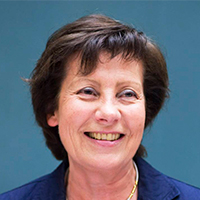Erika Feller
Erika Feller, who graduated with a Bachelor of Laws from the University of Melbourne, has been a national and international (UN) diplomat for over 40 years. Currently, she is also the chair of the advisory board in of the Peter McMullin Centre on Statelessness.
I have emailed Erika five times, hoping to interview her about how she went from a law graduate from the University of Melbourne to a diplomat and the challenges she faced in her career. At first, I thought she was not interested in this project as she hadn’t replied to me for two weeks. Determined to bring this project to fruition, I decided to send Erika one last email. Little did I know, Erika was in a place where she had no internet access, and opposite to what I had imagined, she was very interested in participating in this alumni project. Despite the fact that we were so keen to meet each other to conduct this interview project, it wasn’t easy to find a time which we can both meet. Due to her job as a diplomat, Erika is constantly moving from one location to another—every time she emailed me back, she was in a different location. I finally managed to interview her when she went back to her old home in France, where she could get access to the internet. She was very generous, as when I asked her how long this interview could be, and she said it can be as long as I want. Despite her busy schedule, Erika was very willing to give me her time. Our zoom interview lasted around two hours.
I began the interview by asking about the role of a diplomat. She says being a diplomat allows you to go to places where tourists cannot go, to see the world as it is. “It also allows you to improve people's lives, which is very rewarding.” However, just as a coin has two sides, being a diplomat is not always rewarding. A diplomat also constantly sees “many things that shouldn't be and continue to be. Sometimes I feel like a disastrous tourist; the refugee thinks that you can come up with a solution to help them, but the fact is that you can’t.”
Struck by the honesty of her response, I asked Erika a follow-up question: why drives her to continue in this challenging career? Erika’s reply reveals her hopeful, optimistic nature:
“it is easy to give up, thinking we can do nothing, or you can think whether there is any small contribution we can make to improve people's lives.”
Curious about how diplomats navigate their roles in times of political tension, I asked Erika about her career while Tony Abbott was Prime Minister. In particular, I was interested in how she reconciled working as a public servant for a government whose refugee policy was widely criticised by human rights activists. Erika explained that:
“The important thing is not to force others to accept what you think, but to find common ground. A lot of discussions are needed to find common ground. You agree to disagree, you look for a solution. It is a solution if, in the end, it can lead you to the goal you have set yourself.”
Erika suggests that students are provided with opportunities to hear from those who practice in human rights. Hopefully, when more students have the opportunity to learn about lawyers working in the field of human rights, this can attract more students to devote themselves to the field of human rights.
Erika’s second goal is to pay attention to women’s voices:
“Whenever I went, I tried to speak with women.”
“Especially if you look at human rights from a global point of view; the people who commit atrocities are almost always caught and brought to justice… Sometimes it takes 5 years,
Drawing upon her experience visiting a refugee camp, Erika noticed that “men will talk about politics, government, where they come from, things that you already know. Whereas women will talk about what happens to them and their families, such as the food, clothing issue, or even domestic violence which is quite common in the refugee camp.” Talking to women refugees allows Erika to know what is happening to them so that she knows what those refugee programs need to be adjusted to help the them. Furthermore, “women tend to learn quicker than men. Men talk about the past, whereas women come together and talk about the future.” Women’s opinions or what women can achieve are constantly being undermined. By taking a step to break those biases and start listening to the voice of women, this helps to break down the prejudice that men are more capable than women, but it also allows Erika to learn about sisterhood, the gender identity of what is being a woman, and the resilience of women.
“Refugees will return to their country when they can. Women bring what they learned, such as empowerment and local leadership from refugee camps or the outside of the world, back to their community. The skills or knowledge they learned help address some of their community's problems.”
The fact that Erika has learned so much from refugees shows that she is open-minded. Usually, people consider communicating with refugees as a means to know their difficulties so as to help them. However, it is rare to think you can learn from refugees. Just as the old saying goes, ‘when three are walking together, I am sure to find teachers among them.’ Not everyone can do it, especially when as one’s career progresses to senior roles. It is uncontentious that Erika is very senior in the field of refugee empowerment, so it is surprising how humble she is, as she is willing to learn from anyone regardless of their status and educational background.
Prepared by: Yu Carina Si-Lok
JD student MLS
September 2022
